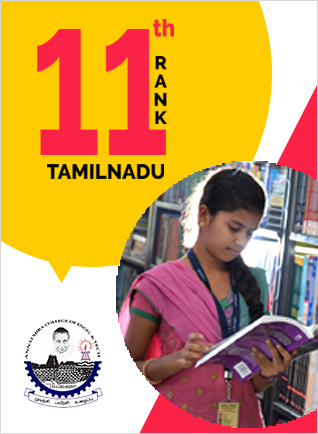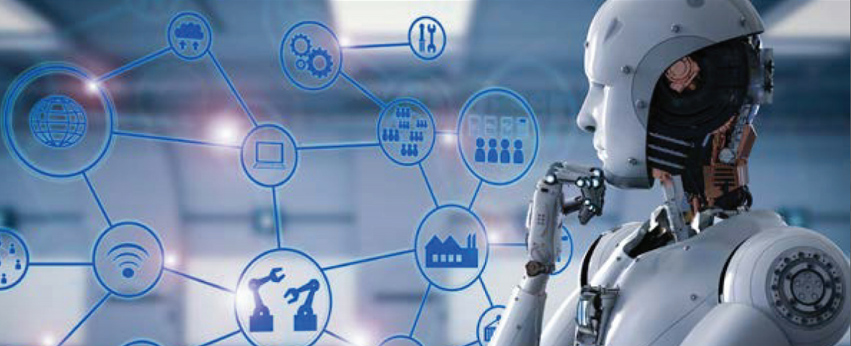- Email: [email protected]
- Mobile: 94433 04963
- Online Grievances
- Careers
- Contact Us
- Follow Us:
Admissions Hotline - 99523 87017
About Department
The Department of Artificial Intelligence and Data Science was established in the academic year2021-2022 , with a commitment to providing high-quality education and fostering discipline among students. Our faculty members play a pivotal role in delivering personalized attention to each student, motivating them to reach their professional aspirations.
All laboratories are equipped with advanced facilities, meeting the requirements of the curriculum to facilitate hands-on learning. The department boasts a team of highly qualified and experienced faculty members, many of whom actively contribute to research in their respective fields. Their research endeavours are frequently published in prestigious national and international journals.
To keep faculty members abreast of emerging technological trends, the department organizes regular workshops focused on advanced topics in mechanical engineering. State-of-the-art facilities are available, including modern laboratories, e-learning-enabled classrooms, and a well-stocked department library, all contributing to an enriched academic experience.
Additionally, the department houses a fully equipped centralized workshop, serving the needs of various other departments. To complement the academic curriculum, guest lectures by industry experts and regular industrial visits are arranged, providing students with valuable exposure to real-world applications.
We strive for holistic excellence, encouraging students to participate in extra-curricular activities that enhance their overall development.
VISION
Our vision is to achieve outstanding standards of quality education through the utilization of cutting-edge tools, aiming to become a center of excellence in the promotion of knowledge centric education, innovation, and state-of-the-art research in the realms of Artificial Intelligence and Data Science.
MISSION
- M1: To impart quality and value-based education and contribute towards the innovation of computing, expert system, Data Science to raise satisfaction level of all stakeholders.
- M2: To educate the future Computing engineering with strong fundamentals by continuously improving the teaching learning methodologies using contemporary aids.
- M3: Enabling students to get expertise in critical skills with Artificial Intelligence domain and facilitate socially responsive research and innovation.
- M4: To encourage professional development of students that will inculcate ethical values and leadership skills while working with the community to address societal issues.
PROGRAM OUTCOMES (POs)
- PO-01:Engineering knowledge: Apply the knowledge of mathematics, science, engineering fundamentals, and an engineering specialization to the solution of complex engineering problems.
- PO-02:Problem analysis: Identify, formulate, review research literature, and analyze complex engineering problems reaching substantiated conclusions using first principles of mathematics, natural sciences, and engineering sciences.
- PO-03:Design/development of solutions: Design solutions for complex engineering problems and design system components or processes that meet the specified needs with appropriate consideration for the public health and safety, and the cultural, societal, and environmental considerations.
- PO-04:Conduct investigations of complex problems: Use research-based knowledge and research methods including design of experiments, analysis and interpretation of data, and synthesis of the information to provide valid conclusions.
- PO-05:Modern tool usage: Create, select, and apply appropriate techniques, resources, and modern engineering and IT tools including prediction and modeling to complex engineering activities with an understanding of the limitations.
- PO-06:The engineer and society: Apply reasoning informed by the contextual knowledge to assess societal, health, safety, legal and cultural issues and the consequent responsibilities relevant to the professional engineering practice.
- PO-07:Environment and sustainability: Understand the impact of the professional engineering solutions in societal and environmental contexts, and demonstrate the knowledge of, and need for sustainable development.
- PO-08:Ethics: Apply ethical principles and commit to professional ethics and responsibilities and norms of the engineering practice.
- PO-09:Individual and team work: Function effectively as an individual, and as a member or leader in diverse teams, and in multidisciplinary settings.
- PO-10:Communication: Communicate effectively on complex engineering activities with the engineering community and with society at large, such as, being able to comprehend and write effective reports and design documentation, make effective presentations, and give and receive clear instructions.
- PO-11:Project management and finance: Demonstrate knowledge and understanding of the engineering and management principles and apply these to one’s own work, as a member and leader in a team, to manage projects and in multidisciplinary environments.
- PO-12:Life-long learning: Recognize the need for, and have the preparation and ability to engage in independent and life-long learning in the broadest context of technological change.
PROGRAM EDUCATIONAL OBJECTIVES (PEOs)
Graduates can
- PEO-01:Utilize their proficiencies in the fundamental knowledge of basic sciences, mathematics, Artificial Intelligence, data science and statistics to build systems that require management and analysis of large volumes of data.
- PEO-02:Advance their technical skills to pursue pioneering research in the field of AI and Data Science and create disruptive and sustainable solutions for the welfare of ecosystems.
- PEO-03:Think logically, pursue lifelong learning and collaborate with an ethical attitude in a multidisciplinary team.
- PEO-04:Design and model AI based solutions to critical problem domains in the real world.
- PEO-05:Exhibit innovative thoughts and creative ideas for effective contribution towards economy building.
PROGRAM SPECIFIC OUTCOMES (PSOs)
Graduates should be
- PSO-01:Evolve AI based efficient domain specific processes for effective decision making in several domains such as business and governance domains.
- PSO-02:arrive at actionable Foresight, Insight, hindsight from data for solving business and engineering problems
- PSO-03:create, select and apply the theoretical knowledge of AI and Data Analytics along with practical industrial tools and techniques to manage and solve wicked societal problems
- PSO-04:capable of developing data analytics and data visualization skills, skills pertaining to knowledge acquisition, knowledge representation and knowledge engineering, and hence capable of coordinating complex projects.
- PSO-05:able to carry out fundamental research to cater the critical needs of the society through cutting edge technologies of AI.
B.Tech in Artificial Intelligence and Data Science Admission Process
The admission process in B.Tech AI and DS is based on the marks obtained in the higher secondary exam.
- Students after qualifying their 10+2 exam from the maths stream with a minimum of 40% of marks are eligible to apply for admission in this course.
- On the basis of these eligibility criteria, students are granted admission to this course.





